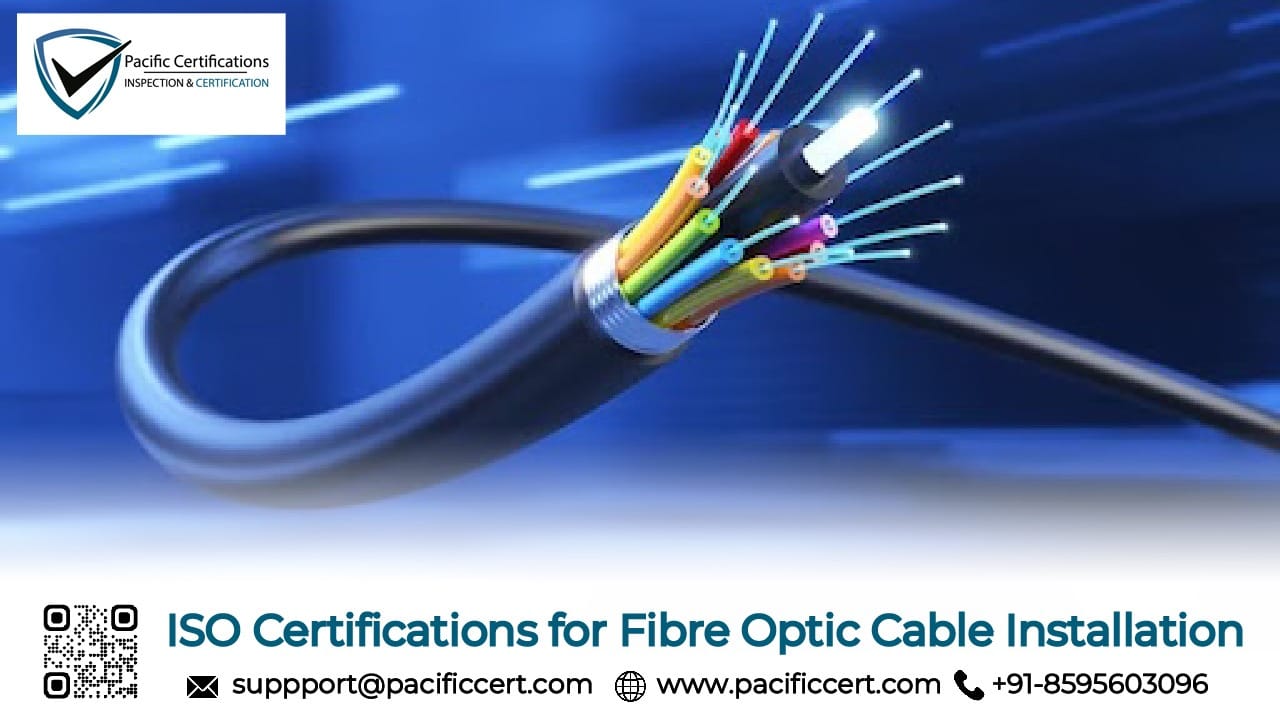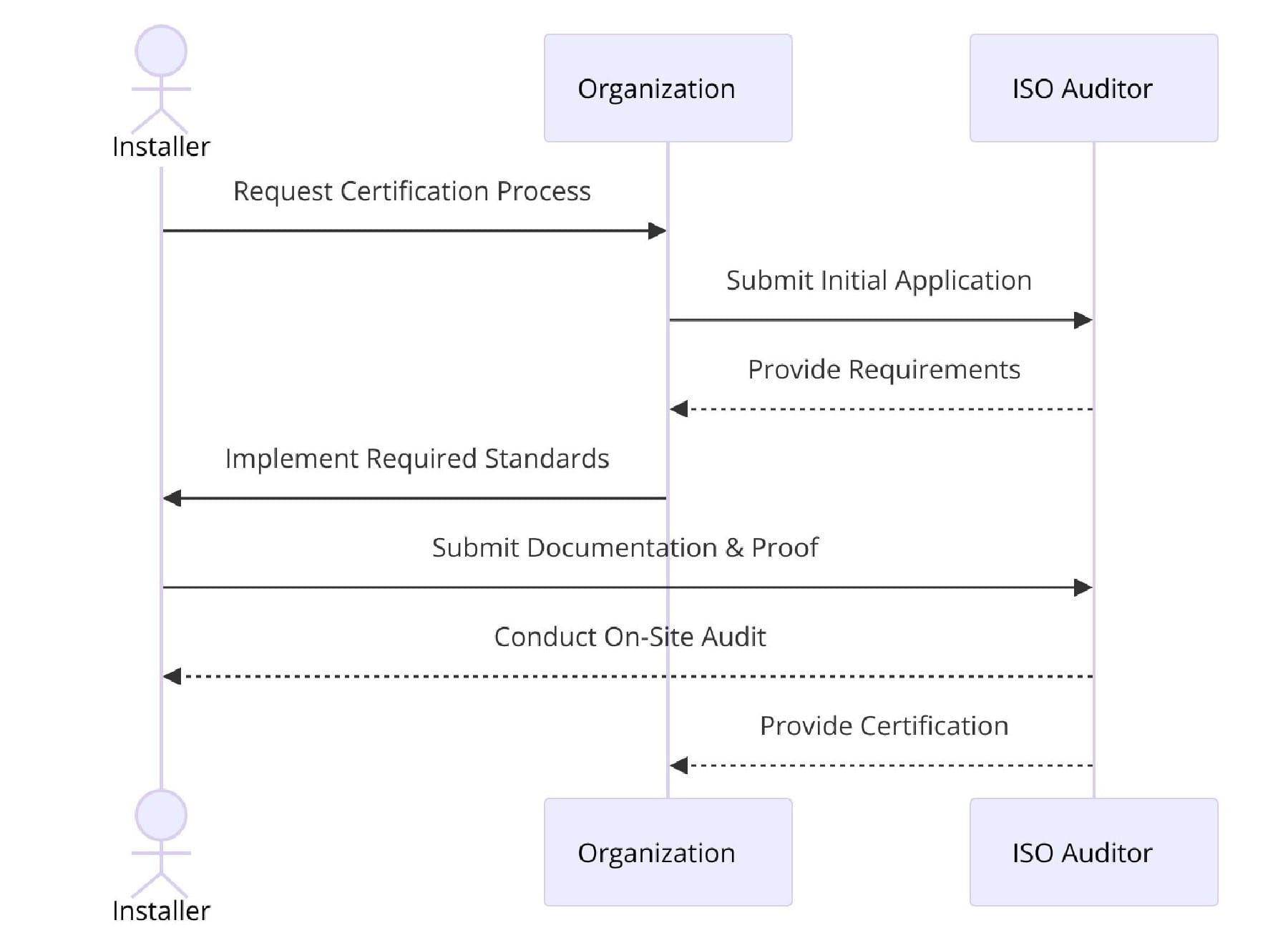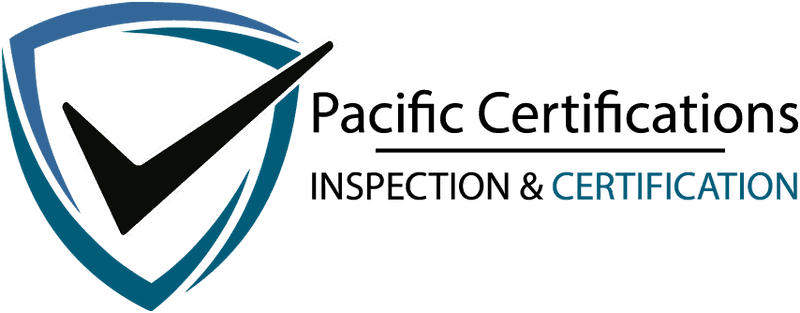ISO Certifications for Fibr Optic Cable Installation Businesses, Requirements and Benefits

Introduction
The demand for high-speed internet and data connectivity has fueled massive growth in fibre optic cable installation worldwide. From telecom operators to infrastructure providers, the industry is under constant pressure to deliver safe, efficient, and reliable installations that meet international standards.
According to Fortune Business Insights (2024), the global fibre optics market is expected to reach USD 20 billion by 2030, growing at a CAGR of 8.9%, driven by 5G expansion, smart cities, and cloud infrastructure projects.
To ensure quality, safety, and long-term reliability, many installation firms are adopting ISO certifications to formalize their processes, improve consistency, and enhance client trust.
Strong connectivity depends on strong systems — ISO certification ensures every fibre installed delivers precision, safety, and trust — Pacific Certifications
Start your ISO certification journey today! Contact [email protected] for expert assistance.
Quick Summary
ISO certifications such as ISO 9001, ISO 14001, ISO 45001, ISO/IEC 27001, ISO 50001, and ISO 22301 help fibre optic cable installation businesses ensure operational efficiency, worker safety, environmental protection, and data security. These standards improve quality management, minimize installation risks, and enhance credibility with telecom clients and government authorities.
Applicable ISO Standards for Fibre Optic Cable Installation
Several ISO standards govern the installation, maintenance, and safety of fibre optic cables. Below are some of the key standards applicable to the industry:
ISO/IEC 11801 – Generic Cabling for Customer Premises: This standard specifies the general requirements for structured cabling systems used in commercial, residential, and industrial environments. It covers the performance characteristics and design guidelines for fibre optic and copper cabling.
ISO 9001 – Quality Management Systems (QMS): ISO 9001 certification ensures that a company follows a systematic approach to quality management. For fibre optic installation companies, it helps in maintaining consistent service quality, customer satisfaction, and regulatory compliance.
ISO 14001 – Environmental Management Systems (EMS): Fibre optic installations often involve extensive ground and aerial work. ISO 14001 certification helps organizations manage environmental impacts, reduce waste, and comply with sustainability regulations.
ISO 45001– Occupational Health and Safety Management Systems : Working with fibre optic cables involves physical risks, including exposure to laser light, sharp fibres, and high-altitude installation. ISO 45001 certification ensures a safe working environment by implementing health and safety management practices.
ISO/IEC 24702 – Industrial Premises Cabling Systems: This standard applies to fibre optic installations in industrial environments, providing guidance on ensuring durability and performance under harsh conditions.
By following these standards, companies can enhance the quality and efficiency of their fibre optic installations while ensuring compliance with industry best practices.
Click here to find out more applicable standards to your industry
At Pacific Certifications, we specialize in auditing and issuing ISO certifications for fibre optic installation companies. As an accredited certification body, we ensure that your organization meets the required ISO standards through a thorough auditing process.
Clarify Your Queries – Have questions about ISO standards? Email [email protected], and our experts will assist you.
What are the requirements of ISO Certifications for Fibre Optic Cable Installation?
Each ISO standard has specific requirements for fibre optic cable installation. Below is a breakdown of key requirements for each relevant standard:
General requirements across all standards:
Quality Policy & Objectives: Define policies and measurable goals for quality, safety, and environmental performance.
Process Documentation: Maintain detailed procedures for cable laying, splicing, termination, and testing.
Risk Assessment: Identify risks related to field safety, data breaches, and equipment failures.
Equipment Calibration: Regularly calibrate OTDRs, splicing machines, and power meters as per ISO/IEC 17025 guidelines.
Training & Competence: Train technicians in fibre handling, installation techniques, and safety compliance.
Health & Safety Management: Implement PPE policies, hazard signage, and electrical safety measures.
Environmental Protection: Manage trench waste, minimize pollution, and comply with environmental regulations.
Information Security Controls: Protect client documentation and digital blueprints under ISO/IEC 27001 requirements.
Energy Monitoring: Track and optimize energy consumption in vehicles, power tools, and project sites.
Internal Audits: Conduct regular audits to verify compliance with ISO standards.
Supplier & Subcontractor Evaluation: Assess suppliers and subcontractors for quality and reliability.
Corrective & Preventive Actions: Identify deviations and take preventive measures for recurring issues.
Management Review: Evaluate project data, safety performance, and improvement opportunities periodically.
Regulatory Compliance: Follow telecom regulations, labor laws, and data protection rules.
Specific requirements:
ISO 9001 – Quality Management System (QMS)
Establish a documented quality management system.
Define customer requirements and ensure service consistency.
Implement corrective and preventive actions for continuous improvement.
Maintain proper records and internal audits.
ISO 14001 – Environmental Management System (EMS)
Identify and mitigate environmental risks related to fibre optic installation.
Implement sustainable practices such as waste management and recycling.
Comply with environmental regulations and sustainability policies.
Conduct regular environmental audits and performance evaluations.
ISO 45001 – Occupational Health and Safety Management System (OHSMS)
Identify workplace hazards related to fibre optic installation.
Develop and implement risk control measures for worker safety.
Provide training on occupational health and safety protocols.
Ensure compliance with local and international safety regulations.
ISO/IEC 11801 – Generic Cabling for Customer Premises
Follow structured cabling design guidelines.
Ensure compatibility with IT and telecommunications networks.
Meet performance requirements for signal transmission.
Implement standardized installation and testing procedures.
ISO/IEC 14763-2 – Implementation and Operation of Customer Premises Cabling
Adhere to best practices for fibre optic cable installation and maintenance.
Conduct inspections and quality checks to ensure compliance.
Establish documentation and labeling for easy identification.
ISO/IEC 30129 – Telecommunications Bonding Networks
Implement grounding and bonding techniques for fibre optic systems.
Reduce electromagnetic interference to ensure network reliability.
Comply with safety guidelines for electrical protection.
ISO/IEC 24702 – Industrial Premises Cabling Systems
Ensure cabling systems withstand harsh industrial environments.
Follow durability and protection requirements for cables.
Implement testing methods to confirm installation quality.
Tip: Start with ISO 9001, 14001, and 45001, this trio builds the foundation for quality, safety, and environmental compliance. Once stabilized, expand into ISO/IEC 27001 and ISO 22301 to secure data and ensure service continuity.
For ISO certification assistance, contact [email protected].
What are the benefits of ISO Certifications for Fibre Optic Cable Installation?
Investing in ISO certification brings multiple benefits for companies involved in fibre optic cable installation. Some of the key advantages include:
Project Quality: ISO 9001 ensures precise installation, better workmanship, and consistent service delivery.
Safety Culture: ISO 45001 reduces onsite accidents and fosters a safer work environment.
Sustainability: ISO 14001 promotes responsible waste management and eco-friendly materials.
Data Protection: ISO/IEC 27001 safeguards sensitive client and infrastructure information.
Operational Continuity: ISO 22301 prepares businesses for emergencies like equipment breakdowns or supply chain delays.
Efficiency: ISO 50001 cuts fuel and electricity costs during installation and maintenance operations.
Accurate Testing & Calibration: ISO/IEC 17025 ensures reliability in fibre optic testing and measurement.
Risk Reduction: ISO 31000 helps predict and mitigate project and financial risks effectively.
Tender Eligibility: Many telecom and government projects require ISO-certified contractors.
Recognition: Certification enhances brand reputation and helps in securing cross-border contracts.
The fibre optic installation sector is rapidly expanding with the global rollout of 5G networks, FTTH (Fibre-to-the-Home) projects, and smart infrastructure development. Precedence Research (2025) projects a 9% CAGR in fibre deployment through 2030.
Companies adopting ISO 9001 and ISO 45001 have reported 30% higher project efficiency and 40% lower accident rates. Similarly, ISO 27001 adoption is rising due to the increasing cybersecurity risks associated with telecom infrastructure.
By 2030, integrated ISO-certified systems combining quality, safety, data protection, and energy management will be a baseline expectation for all major telecom infrastructure contractors worldwide.
How Pacific Certifications Can Help
Pacific Certifications, accredited by ABIS, provides independent audit and certification services for ISO standards relevant to the fibre optics and telecommunications sectors.
Pacific Certifications can help by:
Conducting audits for ISO 9001, 14001, 45001, 50001, 27001, and 22301.
Issuing accredited ISO certificates recognized by telecom clients and regulators.
Supporting integrated management system certification for contractors and service providers.
If you need support with ISO certification for your Fibre Optic Cable Installation business, contact us at [email protected] or +91-8595603096.
FAQs: ISO Certifications for Fibre Optic Cable Installation
1. Why is ISO certification important for fibre optic cable installation?
ISO certification ensures that fibre optic installations meet quality, safety, and environmental standards, helping businesses comply with regulations and enhance their reputation.
2. Which ISO certification is most relevant for fibre optic installation companies?
The most relevant certifications include ISO 9001 (Quality Management), ISO 14001 (Environmental Management), ISO 45001 (Health & Safety), and ISO/IEC standards for structured cabling and installations.
3. How can Pacific Certifications help with ISO certification?
Pacific Certifications is an accredited certification body that provides auditing and certification services for fibre optic installation companies. We ensure compliance with ISO standards through a structured assessment process.
4. How long does it take to get ISO certified?
The time required depends on the company’s preparedness. After a successful audit, certification can typically be issued within a few weeks.
5. How can I contact Pacific Certifications?
You can reach us via email at [email protected] for more information on the certification process.
Author: Pooja
Read More at: Blogs by Pacific Certifications
